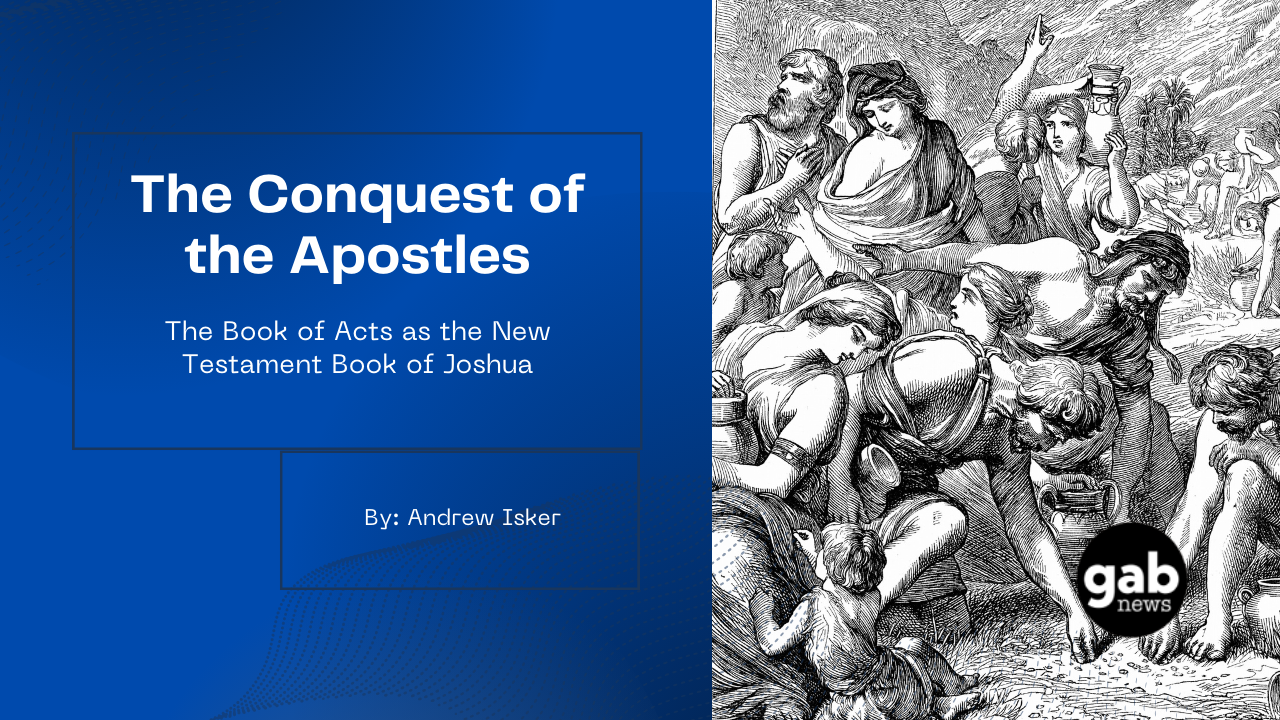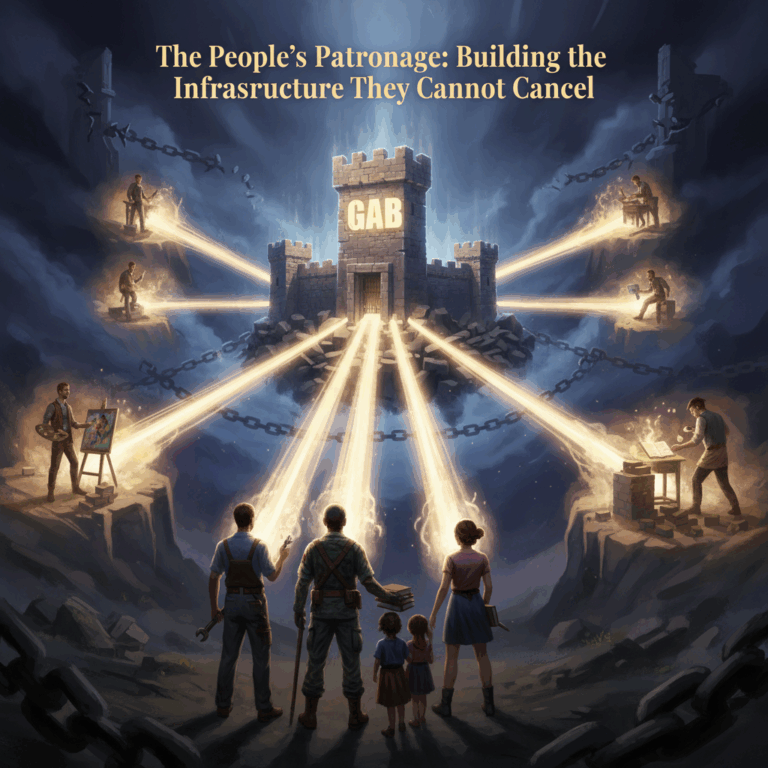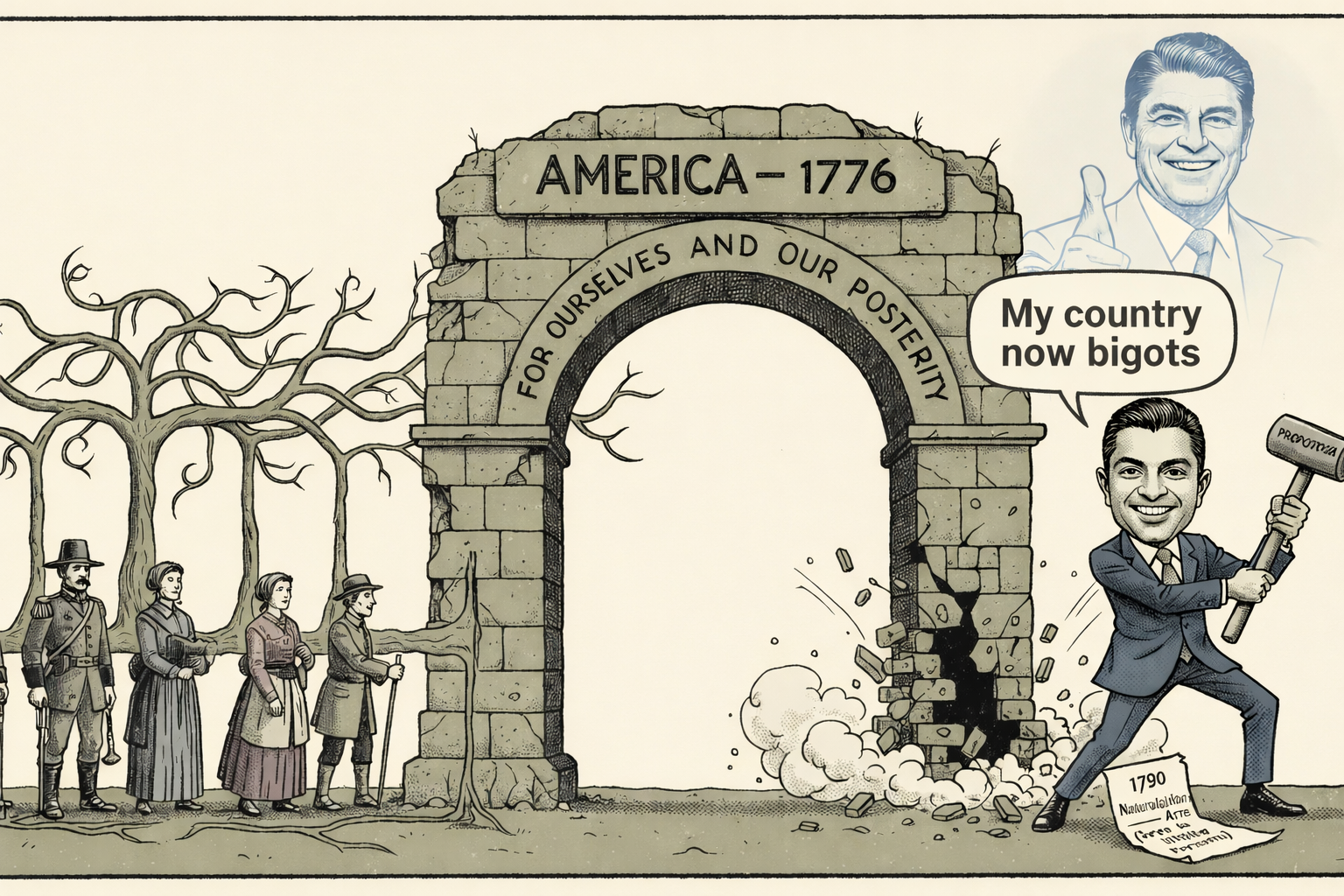The Book of Acts as the New Testament Book of Joshua
Introduction
The Book of Acts or the Acts of the Apostles is the second book of Luke’s Gospel. Some people sort of treat it like an appendix to the gospel; “the really important stuff happened in the gospels, this is story of what happened afterward.” When I was younger, that attitude made me wonder, “why didn’t everything just end right at the Resurrection and Ascension? Why did history keep going? Why was there another 30 plus years pictured here in the Bible? Why has there been nearly another 2000 years?” History does not stop with Jesus’ crucifixion, resurrection, and ascension. A new world with a new history begins.
This book is a book of conquest. The army of God marching out to conquer the world. And we will soon see just how much it intentionally parallels the Book of Joshua, where God’s people entered the Land of Promise and put it to sword and fire. Here, the army of God, sets out to take the new Land of Promise—the entire world.
1 The former account I made, O Theophilus, of all that Jesus began both to do and teach, 2 until the day in which He was taken up, after He through the Holy Spirit had given commandments to the apostles whom He had chosen, 3 to whom He also presented Himself alive after His suffering by many infallible proofs, being seen by them during forty days and speaking of the things pertaining to the kingdom of God.
4 And being assembled together with them, He commanded them not to depart from Jerusalem, but to wait for the Promise of the Father, “which,” He said, “you have heard from Me; 5 for John truly baptized with water, but you shall be baptized with the Holy Spirit not many days from now.” 6 Therefore, when they had come together, they asked Him, saying, “Lord, will You at this time restore the kingdom to Israel?” 7 And He said to them, “It is not for you to know times or seasons which the Father has put in His own authority. 8 But you shall receive power when the Holy Spirit has come upon you; and you shall be witnesses to Me in Jerusalem, and in all Judea and Samaria, and to the end of the earth.”
9 Now when He had spoken these things, while they watched, He was taken up, and a cloud received Him out of their sight. 10 And while they looked steadfastly toward heaven as He went up, behold, two men stood by them in white apparel, 11 who also said, “Men of Galilee, why do you stand gazing up into heaven? This same Jesus, who was taken up from you into heaven, will so come in like manner as you saw Him go into heaven.”
12 Then they returned to Jerusalem from the mount called Olivet, which is near Jerusalem, a Sabbath day’s journey. 13 And when they had entered, they went up into the upper room where they were staying: Peter, James, John, and Andrew; Philip and Thomas; Bartholomew and Matthew; James the son of Alphaeus and Simon the Zealot; and Judas the son of James. 14 These all continued with one accord in prayer and supplication, with the women and Mary the mother of Jesus, and with His brothers.
15 And in those days Peter stood up in the midst of the disciples (altogether the number of names was about a hundred and twenty), and said, 16 “Men and brethren, this Scripture had to be fulfilled, which the Holy Spirit spoke before by the mouth of David concerning Judas, who became a guide to those who arrested Jesus; 17 for he was numbered with us and obtained a part in this ministry.”
18 (Now this man purchased a field with the wages of iniquity; and falling headlong, he burst open in the middle and all his entrails gushed out. 19 And it became known to all those dwelling in Jerusalem; so that field is called in their own language, Akel Dama, that is, Field of Blood.)
20 “For it is written in the Book of Psalms:
‘Let his dwelling place be desolate,
And let no one live in it’;
and, ‘Let another take his office.’21 “Therefore, of these men who have accompanied us all the time that the Lord Jesus went in and out among us, 22 beginning from the baptism of John to that day when He was taken up from us, one of these must become a witness with us of His resurrection.”
23 And they proposed two: Joseph called Barsabas, who was surnamed Justus, and Matthias. 24 And they prayed and said, “You, O Lord, who know the hearts of all, show which of these two You have chosen 25 to take part in this ministry and apostleship from which Judas by transgression fell, that he might go to his own place.” 26 And they cast their lots, and the lot fell on Matthias. And he was numbered with the eleven apostles.
Acts 1:1-26
Prologue (v. 1-3)
Luke begins his account just like his gospel, with a dedication to someone named Theophilus. There is much speculation about who Theophilus was, if it was someone in the Roman court, for instance, or if it is a codename for someone important (it means “lover of God.” Or if that name is a real person at all. The fact is, we don’t know for certain who it is, but the meaning of that name is the most important thing. This book is written for the Lover of God. In one sense, it is written for each individual Christian. You are a “Theophilus.” Whether or not there was a person with this name, this book is also written for you.
Luke tells us about his previous book, the Gospel of Luke, about all that Jesus began to do and teach until the day He was taken up. Now we are told of the Spirit being given to the apostles whom He chose. These men He had presented Himself to over the course of forty days, teaching them of the kingdom of God.
That number forty is not random, either. The people of God waited for forty years in the wilderness for the unbelieving generation to die off before they could enter the land. The last to die of that generation was Moses, and leadership was transferred to Joshua. The forty years pass, Moses “goes up” (on the mountain) and the conquest can begin.
The Ascension (v. 4-11)
They were all assembled together with Him and He gives a final command, you will depart from Jerusalem, but not before the “promise of the Father” comes. What is that? John the Forerunner washed with water, but you will be washed with the Holy Spirit. They ask Him does this mean that now you will restore the Kingdom to Israel? It is a question that makes sense to them, He is very clearly the Messiah, He has suffered and died and risen again, so why wouldn’t Israel be liberated from foreign rule and now begin a kingdom that will take over the entire earth? That is what they are expecting. With this in mind, Jesus answer to them is interesting. He doesn’t say “no.” He tells them it is not for them to know the times or the seasons which the Father has put in His own authority. The throne of David is indeed going to rule over the entire earth, but God’s kingdom is not going to look like they expect. And the timeframe for the Kingdom of God is not something they will be told. Instead they are given a mission to realize this kingdom on the earth: they will receive power when the Holy Spirit comes upon them. And they will be witnesses—martyrs—to Him in Jerusalem, all Judea and Samaria, and to the end of the earth.
That geography Jesus gives is concentric. It begins in Jerusalem, then continues on to the whole of Israel (Judea and Samaria), then it radiates out to the ends of the earth. This is also the progression of the Book of Acts. First Jerusalem, then Israel, then the nations.
They watch Jesus ascend up and is taken by a cloud. This is the same cloud that appeared at His transfiguration, the same cloud that appeared on Sinai, the same cloud pictured multiple times in the Book of Revelation. It is the glory cloud. God’s chariot takes up Jesus into heaven, beyond the firmament, and there He is seated at His father’s right hand to rule heaven and earth. He is not leaving to abandon His people but to rule.
Two men appear to them in white apparel and ask the men of Galilee, why do you look up into heaven. This same Jesus who was taken up into heaven will come in like manner as you saw Him go. What is going on here? The angels are telling them, by a double witness, that there is going to be a physical, literal return of Jesus to the earth from heaven. They are told this because now it is time to get to work.
The Apostles (v. 12-26)
Where were they this entire time? They are on the Mount of Olives, where the Garden of Gethsemane was, where Jesus had foretold of Jerusalem’s destruction, the mountain outside the city that overlooks the city. It was a “sabbath day’s journey.” What does that mean? Well under the Old Covenant law, you were not supposed to leave your place (Exodus 16:29) and if the generic distance of a place is reckoned by the size of the Levite’s cities of refuge in Numbers 35, that is 2000 cubits. That is more or less the distance you were allowed to travel on the Sabbath, even though we are not told whether this happened on a Saturday or not. The point is this is a subtle indication this book, like the Gospels, is taking place within the Old Covenant. The New Covenant has surely come, but that old world is still standing and the gospel is now taking it apart.
They return to the Upper Room in Jerusalem where they had been and they are named. There are eleven total. We are told in the meantime they continued in prayer and supplication, and they are with the women, Mary the mother of Jesus, and with His brothers. Those who wish to maintain Mary’s perpetual virginity don’t want those brothers to be Mary’s children, but there is no compelling reason to believe these brothers are not her sons. The fact that they are included here isn’t a certainty that they are hers and Joseph’s sons, but it seems very likely.
At this time, Peter takes the lead of the disciples, who number about 120 (an interesting numerology 12×10), and he makes the point that Scripture had to be fulfilled, the Holy Spirit spoke by the mouth of David about Judas, who betrayed Jesus. He was in our number, he had a particular office of ministry among us. We are given by look here a postscript of what happened to Judas. He took the 30 pieces of silver, bought a field, hung himself, and fell bursting open and his entrails burst out. Why is Luke so graphic here? Because we need to know what the result of Judas’s wickedness was. Judas’s fate is a warning to us. Peter cites two Psalms regarding Judas, first Psalm 69 which is an imprecatory prayer of Jesus regarding Judas:
19You know my reproach, my shame, and my dishonor;
My adversaries are all before You.
20Reproach has broken my heart,
And I am full of heaviness;
I looked for someone to take pity, but there was none;
And for comforters, but I found none.
21They also gave me gall for my food,
And for my thirst they gave me vinegar to drink.
22Let their table become a snare before them,
And their well-being a trap.
23Let their eyes be darkened, so that they do not see;
And make their loins shake continually.
24Pour out Your indignation upon them,
And let Your wrathful anger take hold of them.
25Let their dwelling place be desolate;
Let no one live in their tents.
26For they persecute the ones You have struck,
And talk of the grief of those You have wounded.
27Add iniquity to their iniquity,
And let them not come into Your righteousness.
28Let them be blotted out of the book of the living,
And not be written with the righteous.
This psalm is about Jesus on the cross (notice the gall and vinegar), crying out to His Father to save Him, and in the midst of it, He asks for the wicked to have indignation poured out upon them and their dwelling place to be desolate.
Peter also cites another imprecatory psalm, Psalm 109:
1Do not keep silent,
O God of my praise!
2For the mouth of the wicked and the mouth of the deceitful
Have opened against me;
They have spoken against me with a lying tongue.
3They have also surrounded me with words of hatred,
And fought against me without a cause.
4In return for my love they are my accusers,
But I give myself to prayer.
5Thus they have rewarded me evil for good,
And hatred for my love.
6Set a wicked man over him,
And let an accuser stand at his right hand.
7When he is judged, let him be found guilty,
And let his prayer become sin.
8Let his days be few,
And let another take his office.
9Let his children be fatherless,
And his wife a widow.
10Let his children continually be vagabonds, and beg;
Let them seek their bread also from their desolate places.
11Let the creditor seize all that he has,
And let strangers plunder his labor.
12Let there be none to extend mercy to him,
Nor let there be any to favor his fatherless children.
13Let his posterity be cut off,
And in the generation following let their name be blotted out.
14Let the iniquity of his fathers be remembered before the Lord,
And let not the sin of his mother be blotted out.
15Let them be continually before the Lord,
That He may cut off the memory of them from the earth;
16Because he did not remember to show mercy,
But persecuted the poor and needy man,
That he might even slay the broken in heart.
17As he loved cursing, so let it come to him;
As he did not delight in blessing, so let it be far from him.
18As he clothed himself with cursing as with his garment,
So let it enter his body like water,
And like oil into his bones.
19Let it be to him like the garment which covers him,
And for a belt with which he girds himself continually.
20Let this be the Lord’s reward to my accusers,
And to those who speak evil against my person.
From this, Peter deduces that this office must be filled by one of the other disciples. Two candidates are found to be suitable Barsabas or Joseph Justus and Matthias. The disciples prayed and asked God to decide. So they cast lots, and the lot fell upon Matthias. This is the very last place casting of lots is done in scripture. Some speculate they should not have done this, but of course, there is nothing wrong with it at all. This is how God’s people communicated with God in the Old Covenant. Proverbs says the lot is cast into the lap and every decision is from the Lord (Pr. 16:33). This is essentially how the priest’s urim and thummin worked as well. What is significant about this is that the things are about to change radically. Instead of casting lots to ask God what to do, next they will receive the Holy Spirit and He will be who directs them.
Conclusion
What is occurring here in the Book of Acts? A new conquest. Compare this passage with the beginning of Joshua:
1 After the death of Moses the servant of the Lord, it came to pass that the Lord spoke to Joshua the son of Nun, Moses’ assistant, saying: 2 “Moses My servant is dead. Now therefore, arise, go over this Jordan, you and all this people, to the land which I am giving to them—the children of Israel. 3 Every place that the sole of your foot will tread upon I have given you, as I said to Moses. 4 From the wilderness and this Lebanon as far as the great river, the River Euphrates, all the land of the Hittites, and to the Great Sea toward the going down of the sun, shall be your territory. 5 No man shall be able to stand before you all the days of your life; as I was with Moses, so I will be with you. I will not leave you nor forsake you. 6 Be strong and of good courage, for to this people you shall divide as an inheritance the land which I swore to their fathers to give them. 7 Only be strong and very courageous, that you may observe to do according to all the law which Moses My servant commanded you; do not turn from it to the right hand or to the left, that you may prosper wherever you go. 8 This Book of the Law shall not depart from your mouth, but you shall meditate in it day and night, that you may observe to do according to all that is written in it. For then you will make your way prosperous, and then you will have good success. 9 Have I not commanded you? Be strong and of good courage; do not be afraid, nor be dismayed, for the Lord your God is with you wherever you go.”
10 Then Joshua commanded the officers of the people, saying, 11 “Pass through the camp and command the people, saying, ‘Prepare provisions for yourselves, for within three days you will cross over this Jordan, to go in to possess the land which the Lord your God is giving you to possess.’ ”
The Lord tells Joshua, listen to everything that I have commanded Moses and go and conquer the Land. What does Jesus tell His apostles. Listen to everything I have told you, and go be my witnesses in Jerusalem, Judea and Samaria, and the end of the earth.
In response to Joshua giving the marching orders to the officers of the people, they in turn encourage Joshua to be strong and courageous. Here, angels encourage the disciples, telling them that Jesus would return.
Next, the officers of the people prepare the army for conquest in the rest of chapter 1, and the disciples prepare for their battle by replacing Judas’s office. They haven’t been through the baptism yet. They haven’t crossed the Jordan river yet. The apostles haven’t been baptized with the Spirit yet. That is about to happen.
As we continue on in Acts, we will continue to see these parallels and they will become more obvious to us. But at this point we must conclude that what began here in Acts is still ongoing. Rather than Acts being an afterthought for the church, rather than thinking all the important stuff happened in the gospels and this is just interesting history, this is our history, this is a history that we are part of.
This conquest that began in 30 AD, you are a part of today. You are part of this Spirit-filled army that wields a sword and fire. You wield the sword of the word and the fire of the Spirit. You have been given the cherubim’s flaming sword. That’s what it is. This is how you should understand the Christian life and as we walk through Acts it will become clearer and clearer. The Christian life is war. The Christian life is holy war. This one life you have been given is to be spent taking whatever territory you can for Jesus Christ and His kingdom.
This should change how you view your life. Instead of a life being meaningless or boring or unimportant, or a life about getting whatever enjoyment you can while you are still breathing and making everything about what you can experience and consume, it is a life that is wholly dedicated to God and His kingdom.
When you embrace this life of spiritual warfare, your life now has a purpose it never had before, you were made to fight for that which is true and good and beautiful, to fight for what is holy and just and lovely. You were made for warfare. Often that warfare starts within yourself, repenting of sin, putting your own sin to death, and being transformed in your inner man by the Word of God and the work of His Spirit. God’s warrior is a person who is continually being sanctified. But it does not stop there. That sanctification cannot but have an impact on the world around you and on the people around you. You cannot help but change things around you.
So the charge to you is this: to embrace this conquest. To embrace your place as a member of God’s army. To conquer the world through faithfulness to Christ. To know that every sin you put to death in yourself, you are that much closer to the kingdoms of this world becoming the Kingdom of Our Lord Jesus Christ. In the Name of the Father, the Son, and the Holy Spirit. Amen!

Andrew Isker is the pastor of 4th Street Evangelical Church in Waseca, MN. He is a graduate of Minnesota State University and Greyfriar’s Hall Ministerial Training School, and he has served churches in Missouri, West Virginia, and Minnesota. He is the author (with Andrew Torba) of Christian Nationalism, and the author of the forthcoming book, The Boniface Option. Andrew, his wife Kara, and their five children reside in his hometown of Waseca, MN. He can be found on Gab @BonifaceOption.





